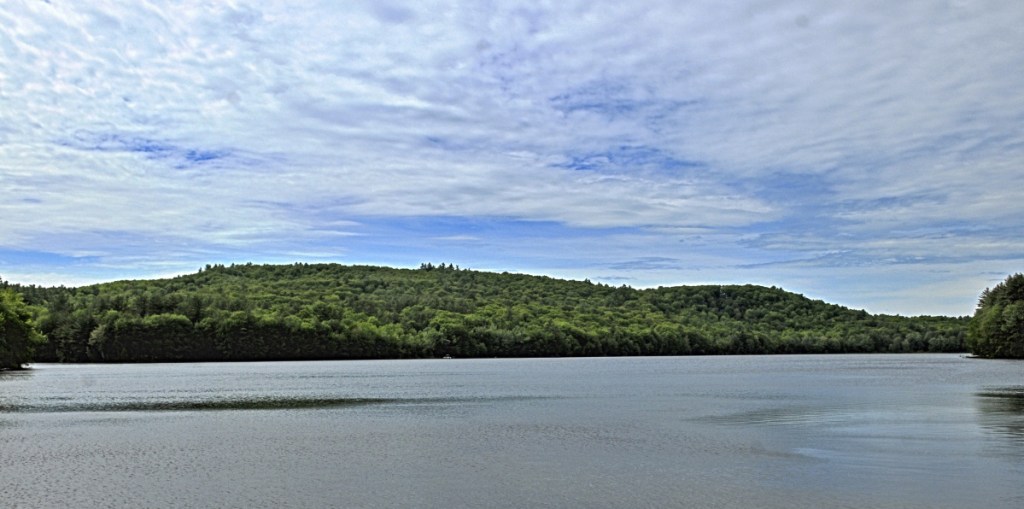It’s clear that Wayne residents are intensely interested in the fate of a 118-acre property on Wilson Pond, acquired by the town two years ago after lengthy non-payment of taxes. At a public forum last month to discuss future uses, some 70 people turned out, this in a town with fewer than 1,200 year-round residents.
Speakers at the forum, who numbered 20, tended to support some form of permanent conservation of the open space, which includes steep slopes, is largely wooded, and has sizable frontage on the pond. A few thought the town should sell the property outright and “put it back on the tax rolls,” where it was before the previous owner stopped paying.
The town has assessed the property at $400,000, but that’s probably high. Real estate appraisers put a likely sale price at $275,000, which could restore an annual tax payment of $4,675.
That sounds like a lot of money in a small town’s budget, but it neglects the future value of conserved land in a state that has seen steadily shrinking access to private land.
Once upon a time, you could hunt and fish, hike and canoe, over the length and breadth of Maine, and hardly anyone objected to your using their land to gain access. Those days are long gone, though they linger on as a nostalgic memory for some.
Led by the Land for Maine’s Future program and dozens of non-profit land trusts, Maine has begun preserving properties large and small over the past three decades — though Maine will never have the kind of grand public parks and preserves that grace so many other urban areas, save in Portland and a few other cities.
Wayne’s comprehensive plan calls for 15 percent of its open space to be conserved permanently; it now has 3 percent saved — a strikingly low percentage compared with other area towns. Manchester has 14 percent of its area in conservation land, while Readfield has 10 percent and Winthrop about 7 percent. Keeping the Wilson Pond property open for public recreation and other uses would provide a modest addition to the 600 acres now open to the public.
Maine has a long and rather short-sighted history of preferring private to public ownership. Following statehood in 1820, the Legislature, increasingly desperate to attract settlers to the state’s vast northern reaches, practically gave away land to any speculator showing interest.
So much disappeared to private ownership that it was only 150 years later that a legislator, aided by environmental reporter Bob Cummings, “discovered” that there were still public lots — for schools and churches — in the townships that had been so hastily disposed of. Their recovery provided a modest start for recent conservation efforts that are restoring a more reasonable balance between public and private.
In Wayne’s case, it would be nice if there were a significant continuing revenue from the property that could recoup some of the $70,000 lost in back taxes and fees incurred in the arduous process of securing title after its previous owner lost interest. But timber on the property is immature, and what’s ready to cut is on slopes allowing only low-impact logging.
Still, having access to water is a great boon to townspeople and visitors. Not many residents can afford to live on the water, but in a region with such spectacular lakes and streams, it seems only fair that every family have a chance to taste some of the beauty.
Selling the property would produce some financial gain, true, but at the cost of Wayne’s long-term identity. Across the country, towns and cities are attracting young residents who want bike paths and hiking trails, safe play areas and room for their kids to roam.
A local conservation nonprofit, the Kennebec Land Trust, could purchase the property or a conservation easement, providing a smaller amount of revenue but leaving the town with an asset of long-term, and increasing, value — if residents prefer that instead of, say, retaining it as a town forest.
Selectmen decided not to submit a ballot question for the Nov. 6 election.
In the end, selectmen should submit a single plan to voters, not a multiple-choice question one speaker, perhaps naively, suggested could be resolved through ranked-choice voting. A plan that reflects the values and interests of a broad consensus of the town is what’s needed, and Wayne is probably not far from finding it.
Douglas Rooks has been a Maine editor, opinion writer and author for 33 years. His new book is “Rise, Decline and Renewal: The Democratic Party in Maine.” He welcomes comment at: drooks@tds.net
Correction: A previous version of this column said the town of Wayne would host an informational forum on Oct. 16. Because the issue in question will not be on the Nov. 6 ballot, that public forum will not be held.
Send questions/comments to the editors.



Success. Please wait for the page to reload. If the page does not reload within 5 seconds, please refresh the page.
Enter your email and password to access comments.
Hi, to comment on stories you must . This profile is in addition to your subscription and website login.
Already have a commenting profile? .
Invalid username/password.
Please check your email to confirm and complete your registration.
Only subscribers are eligible to post comments. Please subscribe or login first for digital access. Here’s why.
Use the form below to reset your password. When you've submitted your account email, we will send an email with a reset code.